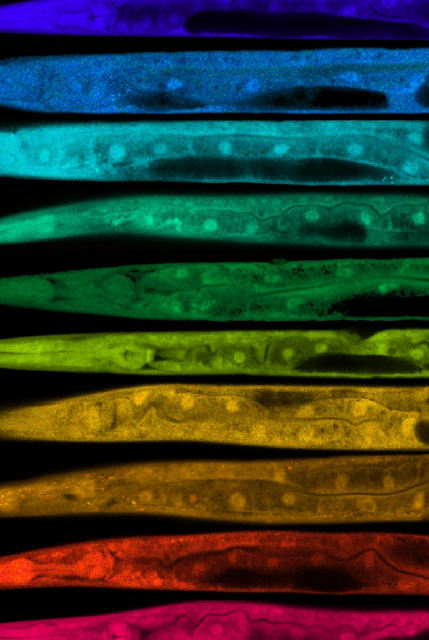The Invertebrate Longevity and Healthspan Core assists investigators throughout the research community in quantifying a variety of longevity and healthspan measures in two of the major invertebrate model organisms: the budding yeast Saccharomyces cerevisiae and the nematode Caenorhabditis elegans. This is accomplished through direct collaboration, training and outreach, and the development and dissemination of new tools and technologies. New technologies we develope and disseminate include microfluidic tools for invertebrate aging studies and the WormBot, a robotic system for high-throughput survival and behavioral phenotyping in C. elegans. We also work to develop chemostat-based solutions for obtaining age-matched pure populations of yeast for biochemical and cell biological experiments requested by Core users. The focus on yeast and worms allows us to provide services and technologies to a large number of external investigators and thereby have a correspondingly large impact. The data generated by this Core can often be correlated with high dimensional computational analyses and with the protein and metabolite phenotypes studied in the other Nathan Shock Center Cores. Invertebrate models are also highly accessible to junior investigators, and our Center pilot projects allow these investigators access to the full range of integrated services provided by the Center Resource Cores.
Services Available:
The following services are available to all users. Additional services may also be available and users are encouraged to contact the Core Director to discuss specific experimental details. Typical costs are provided below for initial budget preparation and may be used for Pilot Project submissions, but in all cases final costs will be determined following consultation with Core personnel.
Saccharomyces cerevisiae
- Replicative life span analysis. The Core will perform replicative life span (RLS) studies on yeast strains provided by users by the standard micromanipulation method [1]. Cost: Estimated user costs are $750 for a standard RLS assay performed on 300 individual mother cells.
- Growth rate and stress resistance assays. The Core will utlize our Bioscreen C MBR method [2-4] to quantify maximal growth rate (doubling time) under optimal nutrient conditions and resistance to environmental or chemical stressors upon request. Specialized screening for mTOR inhibitory activity, mitochondrial inhibition, and anti-fungal properties is also available. Cost: Estimated assay cost is $250 per 100 microcultures.
- Microfluidic device design. The Core will provide microfluidic chips suitable for trapping yeast mother cells for replicative aging studies of lifespan and protein localization/quantitation. Cost:$100/device
- Microfluidic lifespan and protein localization. The Core will perform replicative aging studies using our in-house microfluidic system [5, 6]. Assays may be paired with protein localization and quantitation by fluorescence microscopy if suitable reporter strains are available. Cost: Estimated costs are $300 per experiment for RLS analysis. An additional $200 per experiment should be budgeted if fluorescent protein quantitation is desired.
- Access to the yeast longevity database and software. The Core will maintain a database of published and unpublished yeast longevity and healthspan experiments that users will be provided access to, as well as provide software and expertise for analysis of longevity and healthspan data. Users are free to utilize published data sets for additional analyses. Use of unpublished data will be determined on a case-by-case basis. Cost: Access to the yeast longevity database and software will be provided free of charge in combination with RLS or CLS services.
Caenorhabditis elegans
- Life span analysis. The Core will perform life span studies on C. elegans strains using our standard NGM plate method [7]. Cost: The cost for life span analysis will be partially subsidized (50%). Estimated user costs are $500 for a standard life span assay performed on 300 animals.
- Healthspan measures. The Core will assay a variety of age-associated healthspan measures, including: lipofuscin accumulation, muscle function, motility, resistance to polyglutamine or amyloid beta toxicity, and reproductive capacity (brood size). Additional assays may be available upon request. Cost: Cost will vary on a case-by-case basis, depending on services requested.
- WormBot assays. The Core will perform lifespan and healthspan assessments using the WormBot platform [8]. Cost: Estimated costs are $500 per plate. Each plate can accommodate 12 experiments of 20-40 animals per experiment.
- Resistance/sensitivity to environmental or chemical stresses. The core will perform survival assays in the presence of different environmental or chemical stressors upon request. Cost: Cost will vary on a case-by-case basis, depending on services requested.
General and Other Services
- Access to organism-specific collections and libraries. The core will provide users with strains from the yeast ORF deletion collections, overexpression libraries, and GFP libraries for aging-related studies. RNAi clones from the C. elegans RNAi libraries are also available. Cost: Access to libraries is offered free of charge when additional core services are requested.
- Construction and verification of deletion and/or transgenic strains. Core personnel will consult with users on the best strategies for constructing strains of interest that are not currently available. A variety of tools are available for these purposes, including plasmid collections for gene overexpression and DNA templates for PCR gene disruption using auxotrophic markers, and CRSPR and MosSCI systems for nematodes. The Core will make these tools available to users. If desired, core personnel will also construct the strains for users. Cost: Cost will vary on a case-by-case basis, depending on services requested.
- WormBot System. The Core will assist other groups in establishing a WormBot system in their own lab. Cost is approximately $19,634 plus actual shipping and handling. A fully constructed and functional WormBot is shipped and support is provided to establish the operational system in the lab. Additional WormBot support is billed at $120/hr.
Literature Cited:
Core Personnel: The Core is led by Maitreya Dunham and Alex Mendenhall

WormBot
An open-source robotics system for high-throughput lifespan and behavioral phenotyping in C. elegans. […]
